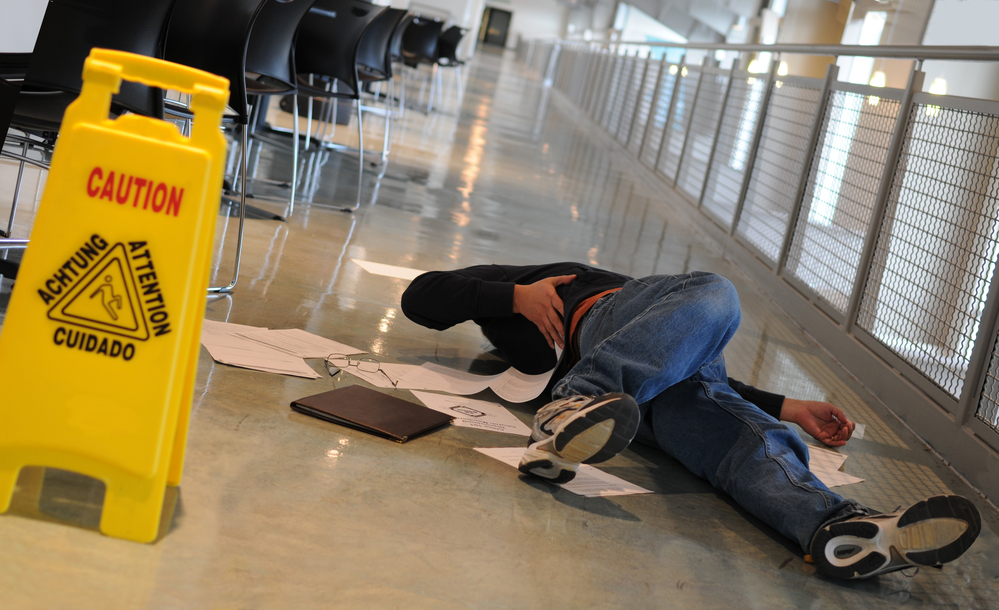 Slips, trips, and falls can happen every day. We’ve all had our clumsy moments, and most of the time, a fall is a simple accident that we can brush off and move on from. But in some cases, a fall can be severe and lead to serious injury—and they can be brought on by someone else’s carelessness. Often, falls occur on property maintained by another person, and the property owner may be held liable for your injuries. But how can you determine liability in these cases? Keep reading to find out.
Slips, trips, and falls can happen every day. We’ve all had our clumsy moments, and most of the time, a fall is a simple accident that we can brush off and move on from. But in some cases, a fall can be severe and lead to serious injury—and they can be brought on by someone else’s carelessness. Often, falls occur on property maintained by another person, and the property owner may be held liable for your injuries. But how can you determine liability in these cases? Keep reading to find out.
Was There a Dangerous Condition?
The first question to ask in establishing liability was whether or not there was a clearly dangerous condition on the property. Such conditions may include, but are not limited to, the following:
If there is no obvious hazard on the property, it will likely be determined that the fall was a simple accident, and not brought on by any issue with the property. However, if there was a clear hazard that led to your fall, it’s time to move on to the next question.
Did the Owner Know about the Problem?
Next, you must address whether or not the property owner knew about the problem and failed to correct it. To do this, you must be able to show that either the owner created the condition, knew of its existence and ignored it, or that the condition existed long enough that the owner should have been aware of it and corrected it before the slip-and-fall accident occurred.
For an example, let’s say that you slip and fall on a spill in a commercial property. If security camera footage shows that the spill was caused by another customer just a minute or two before you passed through the same area, it’s unlikely that the property owner would be held liable. However, if footage shows that the spill occurred half an hour before, and several employees had passed the area without addressing the spill, the property owner should have had sufficient time to notice and correct the hazard.
Residential properties can get a bit more complicated, because you must also show that repairing the condition would not have been unreasonably expensive or difficult for the property owner, and that a serious injury was a foreseeable consequence of not fixing the issue.
What about Rented Properties?
Tenants of a rented property can also seek compensation from their landlord if a dangerous condition on the property was not fixed and led to an injury. In such cases, it is best to have written evidence that the landlord was informed of the dangerous condition at least once, that they had the ability to repair the condition, and they failed to take reasonable steps to prevent the accident that led to the tenant’s injury. This can also apply to guests visiting a rented property, so long as the tenants did inform the landlord of the condition and the landlord had reasonable time to repair it before the injury occurred.
Were You at All Liable for the Injury?
Finally, your own role in the fall must also be addressed. The primary thing to look at in this area is whether or not the dangerous condition was apparent, and you chose to ignore it. One common example of this is a “Wet Floor” sign that you might see on a commercial property; if this sign is present, but you chose to walk quickly or carelessly over the wet surface, the property owner would likely not be held responsible for any resulting fall. Or, if the owner of a residential property pointed out the hazard to you, or if it was otherwise very apparent, and you chose not to proceed cautiously (e.g., didn’t hold onto the handrail when descending obviously icy steps), your own actions could negate the property owner’s liability.
Determining fault in a slip-and-fall accident is rarely cut and dry, and it can be quite complicated. There are many gray areas involved regarding the reasonable actions a property owner should have taken, as well as what precautions you should have reasonably taken when on the property. It is always best to consult with an attorney before pursuing damages in a slip-and-fall claim.
If you would like to schedule a consultation with one of our personal injury attorneys, contact The Harr Law Firm today. We’ll discuss the circumstances surrounding your case and help you decide whether or not you should pursue compensation for your injuries.